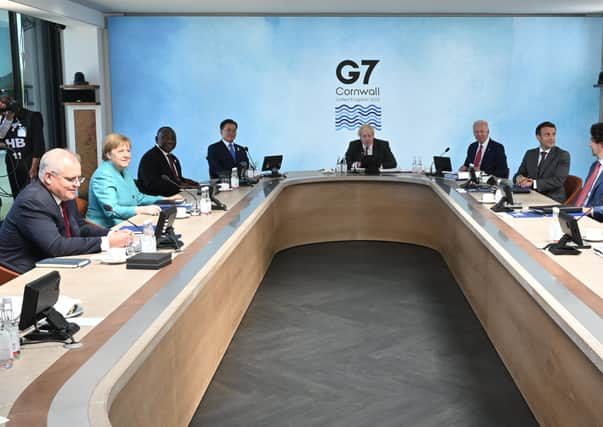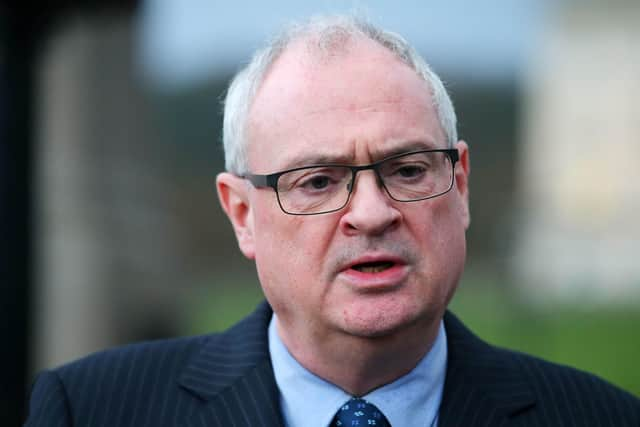Steve Aiken: The Aukus defence deal between America, Britain and Australia signals a US pivot towards the UK from the European Union


As a former submarine commander, the first question I have been asked frequently is about the TV programme HMS Vigil – spoiler alert, it’s nothing at all like real underwater life, but it’s a fun piece of entertainment to while away a Sunday evening.
The second question is related to the new defence deal with Australia.
Advertisement
Hide AdAdvertisement
Hide AdWhy the fuss over it and submarines and what’s all that about — why does Australia even need submarines, why are the French all upset, and quite frankly, why should anyone in Northern Ireland be bothered?


The answers to all of those questions highlights the changing world we are now in, and how, even thousands of miles away, we are in the realms of a global geo-political conflict that has no easy resolution.
The first thing to consider about the so-called Aukus deal is around Australia’s security challenges.
It is a resource rich bastion of democracy and the international system that is being constantly assailed by China, economically, diplomatically, and in the defence arena.
Advertisement
Hide AdAdvertisement
Hide AdThe Australians are not only seen as being a surrogate for the US by China, but with its modern and highly effective armed forces, intelligence gathering capability, and a control over vital raw materials, it is a regional power in its own right.
The Australians, quite rightly, have invested heavily in modern defence systems; they have more P8 Poseidon’s and C-17’s than the RAF, are operating F18 fighters and are reequipping with the F35.
They want to be able to deter threats, far from their shores – and as many maritime nations have discovered, the best way to do this is with submarines armed with long range torpedoes, cruise missiles and, increasingly, autonomous underwater vehicles.
The Royal Australian Navy currently operates the Collins class of sub, based on a Swedish design, their introduction and maintenance in service has been problematic, to say the least.
Advertisement
Hide AdAdvertisement
Hide AdThe cost of this project was astronomical and it was determined that never again would such a failure occur.
This in turn led a $60 billion project (that’s right) for the French Barracuda class submarine. It was, even after just 18 months, falling rapidly behind schedule and vastly over cost.
It was going to be cancelled anyhow, but Australia’s defence needs still needed to be met.
To cover, at speed, with stealth, and to carry the panoply of weapons that Australia needs, the only platform that meets the requirement would be a nuclear powered Submarine (SSGN in NATO parlance) and both the US and the UK were willing to provide the technology and industrial support.
Advertisement
Hide AdAdvertisement
Hide AdWith British Aerospace (Bae) systems already building the Type 26 (or Global Combat Ship) in Australia, and with the US providing many of the combat systems for Australia’s existing submarine programme, it is natural that Canberra looked to both nations to save a failing programme. Aukus, from a solely defence perspective makes sense.
From a geo-political perspective, it is clear that President Joe Biden needed a quick win after the debacle of Afghanistan and the feckless withdrawal.
Across the wider Indian Ocean and critical Western Pacific region, a lot of US prestige and influence appeared to be stalled on the runway at Kabul.
A clear signal to other regional powers, in particular China, about the US commitment was needed. Bringing a clearly significant increase in military capability to a key ally, who is being challenged on a virtually daily basis by Beijing, with a capability that outmatches anything that the Peoples’ Liberation Armry (PLA) or PLA-N (Chinese Armed Forces and Navy) have — or likely to have anytime in the next two decades, sent a strong signal both to Joe’s allies, those wavering in their support to the US, to China, and also, in a less than subtle way, to France (and to the EU).
Advertisement
Hide AdAdvertisement
Hide AdIn some parts of Northern Ireland, and indeed across this Island, there is a tendency to take the US/UK relationship purely through the lens of ‘Brexit and the Protocol’.
To listen to commentators from SF, SDLP, Alliance, Fianna Fail and FG, you would think that the US relationship was dominated by bashing the Brits;.
That the relationship between the UK and the US, with Nato, with the 5 eyes security co-operation agreement, all have greater resonance in Washington than that between the US and Ireland, is a hard lesson for many.
While soft power has its place, hard power, in the form of military capability, economic, security and diplomatic strength, as provided by both the UK and Australia, ‘trumps’ all other issues.
Advertisement
Hide AdAdvertisement
Hide AdFor the US, the Aukus arrangement also serves another very useful purpose.
It tells France, and also Germany, that the US has a limit to its indulgence over the EU’s relationship with China, and with Russia.
That France and Germany where happy to sign a trade agreement and accord with China, when the US administration expressly requested they didn’t, coupled with Germany going ahead with Nord Stream 2 with Russia, again, against the express wishes of the US, means that in Washington, the calculus, on either being closer to the EU or the UK, has at least, in a very significant way, shifted.
France has to deal with the loss of a significant defence project, with the impact on jobs in marginal French cities in an election year.
Advertisement
Hide AdAdvertisement
Hide AdThe cancellation of a $60bn project also says a lot about French technology, the failure to sell hi-tech submarines, coupled with the lack of orders for the Rafale fighter, and the difficulties France has in commissioning nuclear reactors, all point to a national failure to deliver.
The perceived snub to France, by all three of the Aukus nations, in not, quite frankly, accepting them as technology and defence equals, is probably the most difficult issue for Emmanuel Macron to accept as he faces a fiercely competitive race to retain the presidency.
While France will find it difficult to lash out at either the US or Australia, be in no doubt, it will seek to make life difficult for Boris Johnson and the UK. We can expect little slack on migration issues, fishing disputes in the English Channel, or on negotiations on flexibility on the Northern Ireland Protocol.
While some may consider the issue childish in some respects, a spat between Marianne and the Roast Beefs, the unsettling nature of this deal for France, China, along with the reinforcement of the US, UK and Australian Alliance, means that the impacts of this deal will be felt for a long time to come.
Advertisement
Hide AdAdvertisement
Hide AdWhen a strong set of international relationships is needed to deal with an assertive Vladimir Putin, an aggressive China, with massive human rights issues in Hong Kong and Xinjiang province, the threat to Taiwan, Iran, North Korea, and the major matters of the climate emergency and Covid, it is hoped that for France, at least, it quickly realises that pragmatic realism is better than petulant standoffs.
Finally, if you want to watch a submarine programme that is the most realistic, I’d thoroughly recommend the film about a German u boat, Das Boot!
• Commander Steve Aiken OBE MLA is a former Ulster Unionist Party leader
——— ———
A message from the Editor:
Thank you for reading this story on our website. While I have your attention, I also have an important request to make of you.
Advertisement
Hide AdAdvertisement
Hide AdWith the coronavirus lockdown having a major impact on many of our advertisers — and consequently the revenue we receive — we are more reliant than ever on you taking out a digital subscription.
Subscribe to newsletter.co.uk and enjoy unlimited access to the best Northern Ireland and UK news and information online and on our app. With a digital subscription, you can read more than 5 articles, see fewer ads, enjoy faster load times, and get access to exclusive newsletters and content. Visit https://www.newsletter.co.uk/subscriptions now to sign up.
Our journalism costs money and we rely on advertising, print and digital revenues to help to support them. By supporting us, we are able to support you in providing trusted, fact-checked content for this website.
Ben Lowry
Acting Editor